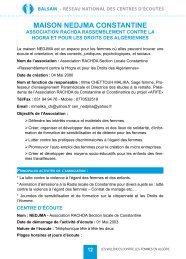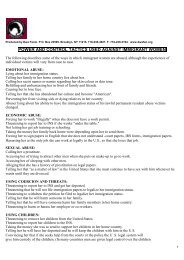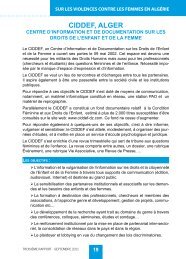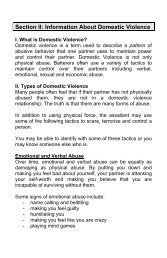Domestic Violence Counseling Manual - Hot Peach Pages
Domestic Violence Counseling Manual - Hot Peach Pages
Domestic Violence Counseling Manual - Hot Peach Pages
Create successful ePaper yourself
Turn your PDF publications into a flip-book with our unique Google optimized e-Paper software.
MISCELLANEOUS TIPS<br />
The following are six statements that a battered woman needs to hear from you and from anyone she<br />
relies on for support:<br />
1. This is not your fault. You are not to blame.<br />
2. I am afraid for your safety and the safety of your children<br />
3. The situation will only get worse.<br />
4. I am here for you.<br />
5. You deserve better than this.<br />
6. You can change your life.<br />
The following are a list of questions you can ask your counselee to assess the situation’s danger level:<br />
• Has the violence, danger, or brutality of the assaults escalated<br />
• Are there knives, guns, or other weapons at home<br />
• Does the perpetrator abuse alcohol or other drugs<br />
• Does the perpetrator assault you while intoxicated or high<br />
• Has the perpetrator threatened or attempted to kill you<br />
• Is the perpetrator assaultive during sex<br />
• Does the perpetrator follow you, monitor your whereabouts, and/or stalk you<br />
• Is the perpetrator jealous or paranoid<br />
• Is the perpetrator depressed or suicidal<br />
• Has the perpetrator experienced recent deaths or losses<br />
• Does the perpetrator have a history of assaulting other people or breaking the law<br />
• Was the perpetrator beaten as a child, or did he witness his mother being beaten<br />
• Are you still living with the perpetrator<br />
Dealing With Incest:<br />
Incest often evokes responses of horror, disbelief, judgment, and denial in both the counselor and the<br />
counselee. Counselors need to recognize the intense pain that can be attached to dealing with this<br />
experience; however, they cannot afford to get “bogged down” in the pain. Counselors must attempt to<br />
hold a realistic perspective by acknowledging the topic and its often-painful consequences, but also by<br />
viewing the client as a whole person who has strength and survival skills and who can resolve the<br />
55-56

















